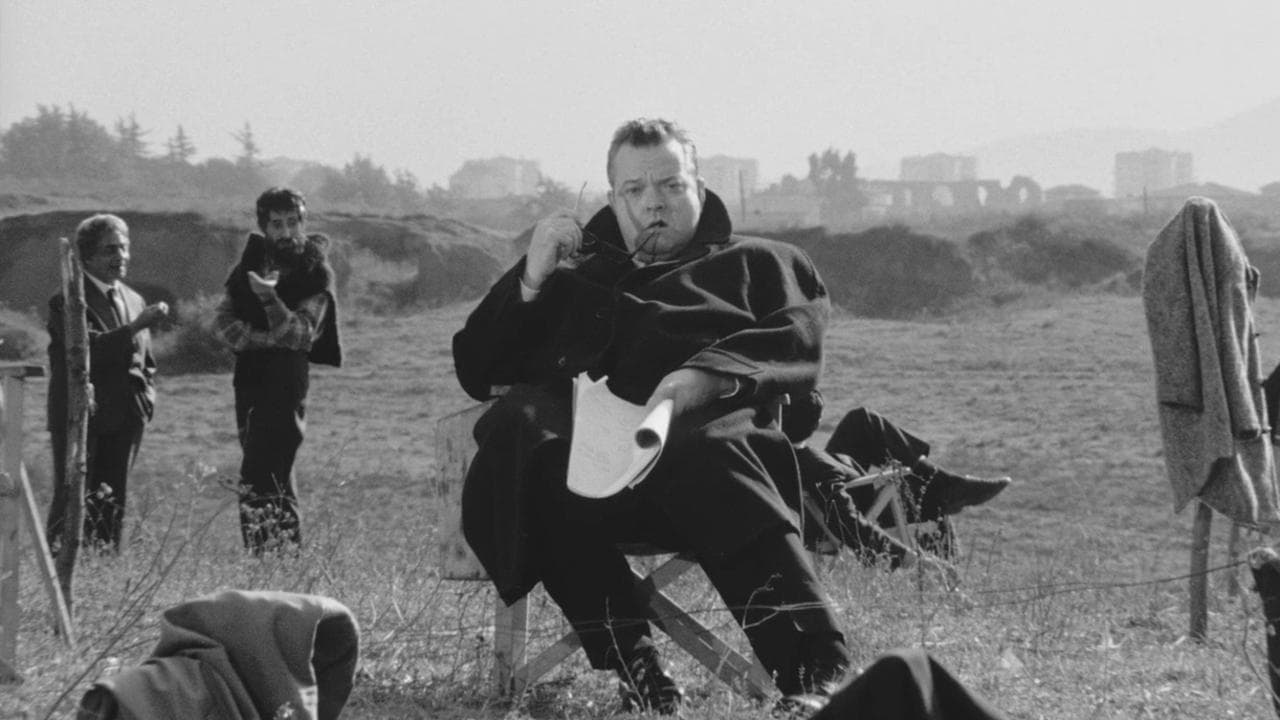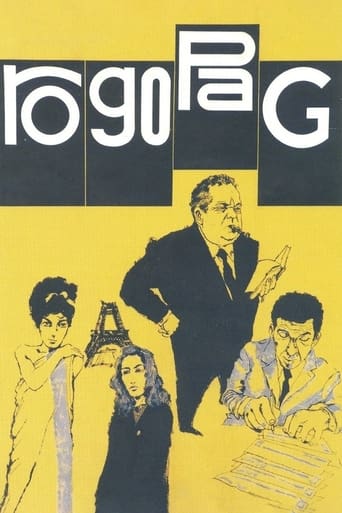StunnaKrypto
Self-important, over-dramatic, uninspired.
PlatinumRead
Just so...so bad
Sammy-Jo Cervantes
There are moments that feel comical, some horrific, and some downright inspiring but the tonal shifts hardly matter as the end results come to a film that's perfect for this time.
Tymon Sutton
The acting is good, and the firecracker script has some excellent ideas.
Dario Vaccaro
Ro.Go.Pa.G is an anthology consisting of four shorts by four of the greatest auteurs in the '60s: Rossellini (whose fame as a master director had already been recognized for at least ten years in the whole world), Godard (one of the fathers of the Nouvelle Vague and clear inspiration for the project as a whole, Pasolini and Gregoretti (at the time two "young" authors in search for glory). As the four segments were developed individually, I think that the best way to comment them would be to do so separately. "Illibatezza" by Roberto Rossellini. The story of an Alitalia hostess victim of what today we'd call a "stalker" who suffers from Oedipus complex. A simple, linear tale, although not immediately clear in its goal, in which the true star is the gorgeous Rosanna Schiaffino. In the American I can't help but see Rossellini's own sexual desire, probably participating in the act through his alter ego. Unfortunately Bruce Balaman (whose career counts only a couple of films) is not as captivating as the female lead, and the use of dubbing on the speaking actor makes things worse for him. It's interesting to note that Anna Maria admits to being obsessed with filming and taking pics of everything she experiences in everyday life, just like today's social networks invite us to do. This is a decisive cut from the author's Catholic phase and a change for the better, without ideological powers pressing on him. 8 "Il Nuovo Mondo" by Jean-Luc Godard. Godard never misses the chance to create something extremely unusual and destabilizing for the viewer, who is challenged to appreciate a language never before used in cinema. The short is about a possible future where an atomic bomb has been dropped near Paris and the psychological outcome this event has over the Parisiennes. The whole story is narrated in first person by the protagonist in voice over, which gives the feeling of reading a diary or a novel, except for a short dialogue between him and his lover (or, rather, "ex-lover"), whom appears to feel nothing anymore. Actually, the whole city "has changed", meaning that the fear of atomic destruction makes everyone's lives numb, with the help of some mysterious pill everybody seems to be taking. What Godard is showing us is the exact opposite of what we'd think a nuclear war would look like: apart from the screams and death of those directly hit by the bombs, everyone else would lose their interest in life, dragging a nihilistic existence, just like Alexandra does. Godard's signature features (jump cuts vs long takes) are there more than ever, with a beautiful fight between melancholy (underlined by the classical music) and raw truth (the fast cuts in the city). 8 "La ricotta" by Pier Paolo Pasolini. This is the most significant and historically important of the four films, so much that many consider this part more cinematically relevant than the whole container Ro.Go.Pa.G. Pasolini was sentenced to four months of reclusion for "contempt of the State religion", and the version we have public access to is a lot different than the original. It is a story about Stracci, a poor man working in the outskirts of Rome as an extra in a colossal about the Passion of Christ. Pasolini's message is very clear: we care more about the passion of the supposed son of God than of his sons'. Thus, while Stracci finally gets his desired meal, the saints in the movie laugh at him and cause his end. On the other hand, the characters of the director (Orson Welles!) and the journalist give out Pasolini's view of society, with the middle man being a "monstruosity" who doesn't understand deep thoughts but only his stupid, futile desires (like the dog). The film manages to be funny and extremely tragic at the same time, and the dycotomy between black-and-white actual world and colored fiction (and also between twist and classical music) explain through sensory experience the gap between reality and what show business wants us to believe. 9"Il pollo ruspante" by Ugo Gregoretti. Of the four, "Il pollo ruspante" is the least interesting short. It is a critique of post-war Italian society, after the economic boom that made the nation and its inhabitants much richer and caused the birth of a larger middle-class. The events are narrated through a commerce professor who speaks using a laryngophone (which somewhat dehumanizes him) and lived by a family of four led by the greatly funny Ugo Tognazzi. Although it has some smart moments, the message underlying lies too much on the surface, making it so explicit that becomes bothering, especially when the customers at the restaurant literally become battery-bred chicken. While the other directors managed to make their films secretly full of meaning, Gregoretti tries way too hard to make everyone in the audience understand everything. Still, Tognazzi is always a delight to watch, and the situations are too surreal to plainly hate them. 7Overall rating: 8
Claudio Carvalho
1) "Illibatezza" ("Pureza" – "Purity") – Director: "Roberto Rossellini" - A Boring Tale of Obsession The Alitalia flight attendant Ana Maria (Rosanna Schiaffino) is harassed by the middle-aged American executive Joe (Bruce Balaban). A psychiatrist gives an orientation to her fiancé Carlo (Carlo Zappavigna), advising Ana Maria to behave like a slut, since the maniac is attracted by her chastity.This first segment of "Ro.Go.Pa.G." is very disappointing, especially because of the name of Roberto Rossellini in the direction. This boring tale of obsession is neither funny nor dramatic, and seems to be only an advertisement of Italian air flight company Alitalia. My vote is four.2) "Il Nuovo Mondo" ("O Novo Mundo" – "The New World") – Director: Jean-Luc Godard - A Dated Romance The boy-friend of the gorgeous Alessandra (Alexandra Stewart) is hardly sleeping, so obsessed he is for her. When she confesses that she is also in love with him, he sleeps for two consecutive days. When he wakes-up, he reads in the newspaper that there was an atomic super-explosion over Paris, but the specialists advise that without any effect in the population. However, Alessandra changes her behavior, ex-loving him, and he feels that a new world without logic and freedom may be arising.This second segment of "Ro.Go.Pa.G." is also very disappointing and absolutely dated in the theme and behavior, with every character smoking cigarettes all the time. It is a clear criticism to the menace of an atomic explosion in times of Cold War, and the absolutism of a world without freedom. The narrative in off makes the viewer expect some intriguing conclusion, but in the end it is completely failed and boring. My vote is four.3) "La ricotta" ("A Ricota") – Director: Pier Paolo Pasolini - An Acid View of the Catholicism and the Dominant Classes While shooting "The Passion of Christ" in the periphery of Rome, the arrogant director (Orson Welles), actors, actresses and cast show their lack compassion with the poor and famine Stracci (Mario Cipriani).This segment is a very acid view of the Catholicism, and a criticism to the bourgeoisie and the behavior of the human beings in general. The character of Stracci symbolizes the poor people in the world, and how despised they are by the hypocrite dominant classes and the Catholic Church that prays for them. The use of black and white to represent the reality, and colors the fiction of the cinema world is also great. My vote is seven.4) "Il Pollo Ruspante" ("Frango Caseiro" – "Home Cockerel") – Director: Ugo Gregoretti - Powerful Criticism to Consumerism and CapitalismWhile traveling to see a field nearby a lake, a family does not resist to the appeal of the consumerism. Meanwhile, a famous professor presents to the dominant classes, procedures to increase the consumerism of ordinary people.This segment is a very explicit criticism to the exaggerated consumerism in the society. The scene when Togni (Ugo Tognazzi) and his middle class family goes to the restaurant is memorable. My vote is seven.My global vote is six.Title (Brazil): "Ro.Go.Pa.G."
debblyst
Rossellini's episode "Illibatezza" is a technically precarious, poorly scripted excuse to a) make an advertisement for Alitalia; b) use unimaginative archive footage of Bangcok and c) film extensively Rosanna Schiaffino's body and face - it's really amateurish, a crying shame from such an important filmmaker.Godard's atmospheric episode examines post-nuclear effects on human behavior and is a clear criticism on nuclear policy, Moscow and absolutism (notice the newspaper headlines, and the way Alessandra keeps robotically repeating "Absolutely"). It's also a study on Alexandra Stewart's beauty and on sound editing. But above all it revisits the lovers'-quarrel-in-an-apartment-theme so dear to Godard (cf. "Breathless", "Une Femme est une Femme"), preparing his extraordinary 30min chef-d'oeuvre apartment sequence in "Le Mépris", his next film, and is in some ways a sketch for his later "Alphaville". Pasolini's "La Ricotta" must rank among his best. It has: a) beautiful color tableaux of the crucifixion, emulating Italian Renaissance painting, especially the Florentines; b) a Fellini-like taste in movement, humor, overlapping dialog and crowd directing; c) contagious Italian pop theme by Carlo Rustichelli; d) Orson Welles's (whose great effort here is to manage reading his cue cards in Italian) self-mocking/realistic character -- a once famous American director who is forced in his decadent years to film low-budget epic films in Italy; e) Pasolini's beautiful, prophetic poem from his Mamma Roma's film journal about artists who are caught in "the borders of the eras"; f) of course, an acid criticism on capitalism and the bourgeoisie; and g) a joyful attempt to humanize (i.e. anti-deify) Jesus and the Gospel, much in the way Rossellini had done with the life of St. Francis of Assisi in 1950's "Francesco Giullare di Dio". Pasolini had to face ferocious Vatican confrontation and lawsuits because of this episode, but he went on to make the revolutionary and much misunderstood "The Gospel According to St. Matthew" in 1964. Very interesting note: in the Italian language version (which is of course post-dubbed, as is the norm in Italian cinema) when the journalist asks the director (Welles) what he thinks about "the great Italian director Federico Fellini" you can see the Italian actor who plays the journalist clearly articulating "...the great Italian director Pier Paolo Pasolini"!!! It says a lot about Pasolini's fame even then and also about how Pasolini mended his coup de vanité in the dubbing so as to finally use the name of his friend Fellini. Oh, and by the way Welles's answer is: "Egli danza....egli danza!" which means "he dances...he dances!".Gregoretti's episode "Il Pollo Ruspante" is well written and interesting, and impressively prophetic of the theories of consumerism and capitalism that are valid still today, in our "post-industrialized" world. Some scenes are too literal (like the one actually showing the chickens eating in a restaurant) and the end is a little bit too heavy, but it has pace and good acting.Overall, Godard and Pasolini definitely make "Rogopag" a worthwhile film. If you're in a hurry you can (sorry to say) just skip Rossellini's episode. My vote for GOPA (Godard+Pasolini): 8/10. My vote for all ROGOPAG: 6/10.
f. baez
"La Ricotta" is Pasolini at his peak, and I find it truly connected to the original spirit of catholicism; we should see every other human being, specially if he´s poor or suffers, as Stracci. We usually act like the players who mock him. "Pollo ruspante" is also good, funny and witty. Godard's segment spoils the film: it is boring, pretentious and lacks spine.

